Multipurpose Cash Assistance
Multipurpose Cash (MPC) are unrestricted cash transfers that people affected by crises can use to cover their basic needs. By its nature, MPC is the assistance modality which offers people a maximum degree of choice, flexibility and dignity. There is also growing evidence that it is more cost-efficient and cost-effective to meet multiple needs.
But this requires new ways of collaborating between humanitarian actors, at all stages of the program cycle, and across sectors. While solid tools exist to support collaboration, they have not been widely adopted and MPC is still used in an ad-hoc way. Challenges remain to be addressed if we are to successfully fit MPC into the humanitarian system.
Featured content

Multipurpose cash outcome indicators and guidance
Guidelines and Tools
The indicators in this document, developed by the Grand Bargain Cash Workstream, focus on the primary objectives of humanitarian Multipurpose Cash Assistance (MPC), and the outcomes to which MPC can most strongly contribute in a given context.
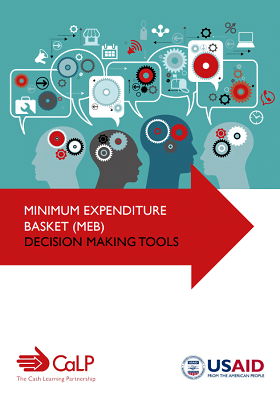
Minimum Expenditure Basket (MEB) Decision Making Tools
Guidelines and Tools
Update: This publication was revised in 2022. Please read the revised publication here.
The purpose of this tipsheet is to accompany practitioners and decision makers through key stages in the process of calculating an MEB to: (a)
identify what is the most appropriate path to take in relation to their
particular context, identified objective, existing capacities and available
resources; and...
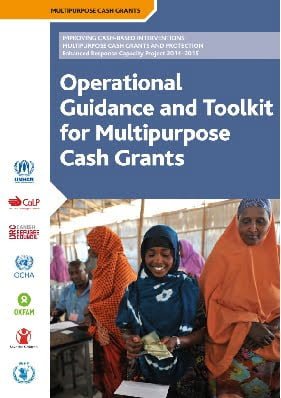
Operational Guidance and Toolkit for Multipurpose Cash Grants
Guidelines and Tools
This operational guidance and toolkit brings together worldwide expertise on cash-based interventions (CBIs). It provides comprehensive and practical guidance for humanitarian actors to assess the feasibility, conceptualise the design and structure the implementation of MPGs. The guidance focuses on MPGs whose primary objective is to meet basic needs as defined by affected people...

Definition of Minimum Expenditure Baskets (MEB) in West Africa
Report
Throughout 2017, five countries in West Africa have worked collectively to define minimum expenditure baskets, in order to better capture the contribution that humanitarian assistance is making to address the basic needs of affected populations, and improve the impact of assistance. This heavy process raises technical and coordination challenges. The CALP Network, with support from USAID /...
Thematic lead
Latest

Multi-purpose Cash Assistance in Lebanon – Impact evaluation on the well-being of Syrian refugees
Report
The two year study assessed the impact of MPC on the well-being of over 11,000 Syrian refugee households living in the Bekaa, North and Mount Lebanon. The study finds that most of the impact of MPC materializes in the long term (over 12 months), while limited impact materializes in the short term. The...

3 things to know about … Integrated Cash and Voucher Assistance (CVA) and Child Protection (CP) during the COVID-19 Pandemic
Guidelines and Tools
This interactive tip sheet highlights why, what and how to integrate CVA and CP during the Covid-19. It provides key programmatic elements and links to relevant resources to inform the design and implementation of integrated programming. The tip sheet was developed to address most of the questions raised...

Webinar | Multi-purpose Cash Transfer and Child Protection: a case study (English and Spanish editions)
Webinar recording
Watch the webinar recording here. More information here. In 2018, with the support of OFDA and FFP, Save the Children implemented a multi-purpose cash transfer ‘Plus’ program in response to the influx of Venezuelan into Colombia. The program aimed at covering vulnerable household’s basic needs and...

COVID-19: A chance to empower citizens through social protection
Report
Billions of US$ are now being distributed to citizens by governments to stave off deteriorating economic impact and rising poverty from COVID-19. The unprecedented pandemic demands an unprecedented government response. More than 126 countries have already introduced or adapted social protection or labour...

CCD Ethiopia one-year in: Collaboration in reality
Report
Based on insights compiled from surveys and interviews conducted with members of the Ethiopian cash community and CCD (Collaborative Cash Delivery Network) members in January 2020, this report provides an overview of how CCD Ethiopia is working towards global and national objectives, takeaways for startup...

External Evaluation of SDC/HA Emergency Cash Pilot For Earthquake Affected Households in Bubq, Albania
Report
In November 2019, Albania was hit by a large earthquake with a magnitude of 6.4, causing 51 people to lose their lives and injuring 913 people. Around 47,000 additional people were directly affected by the earthquake. The Swiss Agency for Development and Cooperation (SDC) immediately deployed a rapid...
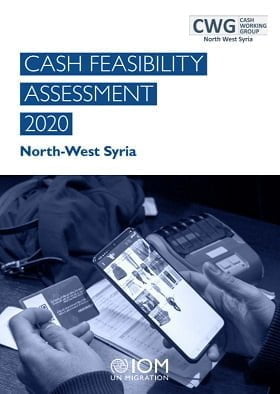
Cash Feasibility Assessment for NorthWest Syria
Report
The objective of this cash feasibility assessment for northwest Syria is to provide evidence-based, structured analysis of the various dimensions that make cash and vouchers interventions feasible. The primary audience for this document are all the organizations either currently involved in cash-based...

Market Based Programming (MBP)
Guidelines and Tools
Market Based Programming (MBP) in Oxfam’s work means we always consider existing markets – through assessments, analysis and programming – across all phases of a response and across all technical sectors. You can also watch the videos below which are available in English, Spanish, Arabic and...

Minimum Expenditure Basket (MEB) Decision Making Tools
Guidelines and Tools
Update: This publication was revised in 2022. Please read the revised publication here.
The purpose of this tipsheet is to accompany practitioners and decision makers through key stages in the process of calculating an MEB to: (a)
identify what is the most appropriate path to take in relation to their
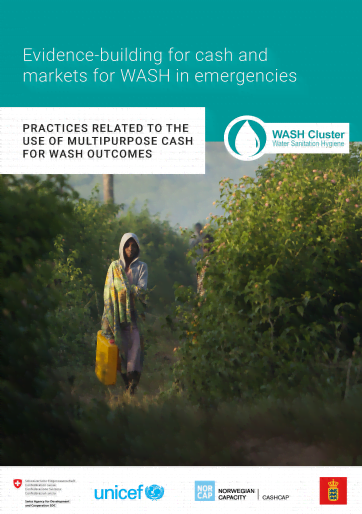
Evidence-building for Cash and Markets for WASH in Emergencies: Practices related to the use of multipurpose cash for WASH outcomes
Report
This report aims specifically to: present current practices (and practice gaps) of the use of MPC for WASH outcomes in emergencies, identifying the contexts and conditions under which MPC is used and highlighting lessons learned in contexts where humanitarian actors use MPC as a tool to meet basic needs,...
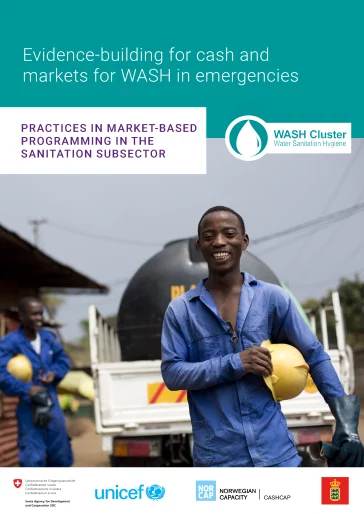
Evidence-building for Cash and Markets for WASH in Emergencies: Practices in market-based programming in the sanitation subsector
Report
This report presents an overview of practices related to the use of market support and cash and voucher assistance (CVA) for sanitation in emergencies. These market-based approaches can have a number of advantages, such as improving the efficiency and effectiveness of emergency sanitation response while...

Evidence-Building for Cash and Markets for WASH in Emergencies: Practices in market-based programming in the hygiene subsector
Report
This report presents an overview of practices related to the use of market support and cash and voucher assistance (CVA) modalities for hygiene in humanitarian crises. These market-based approaches can have a number of advantages, such as improving the efficiency and effectiveness of emergency hygiene...

Evidence-Building for Cash and Markets for WASH in Emergencies: Practices in market-based programming in the water subsector
Report
Humanitarian water, sanitation and hygiene (WASH) practitioners are increasingly using market-based programming (MBP) to deliver safe water in emergency response, with interventions that are designed to work through, or support, local water markets. These market-based approaches have a number of...

Multi-purpose cash assistance and health: Evaluating the effect of the Emergency Social Safety Net (ESSN) programme on access to health care for refugees in Turkey
Policy paper
This policy brief provides a summarizations of a 2019 analysis of data collected by WFP between 2017 and 2019 on refugees in Turkey including the Comprehensive Vulnerability Monitoring Exercise (CVME) in addition to longitudinal data from Emergency Social Safety Net (ESSN) programme applicant households...

Exploring the Pilot of the Multipurpose Cash Outcome Indicators
Webinar
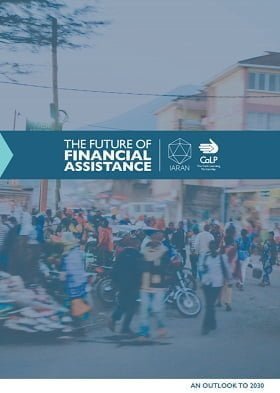
The Future of Financial Assistance – Executive summary
Report
The growing use of cash to meet humanitarian needs is challenging traditional sector and mandate based models, and bringing with it opportunities to work with new partners and tools. With its links to other reforms in humanitarian assistance, such as the push for localisation, participatory approaches,...

Cash Assistance in Lebanon: Accountability to Affected Populations
Report
The international humanitarian response to the devastating Syrian refugee crisis in Lebanon has grown steadily since 2011 and, today, cash and voucher assistance (CVA) comprises over a third of this assistance. The World Food Programme (WFP) started implementation of its multi-purpose cash (MPC) programme...

Multi-Purpose Cash Transfer ‘Plus’: Maximizing impact on children through integrated cash-based programming
Report
In 2018, with the support of OFDA and FFP, Save the Children implemented a multi-purpose cash transfer ‘Plus’ program in response to the influx of Venezuelan into Colombia. The program aimed at covering vulnerable household’s basic needs and prevent them from resorting to negative coping strategies,...

An ABC for MPC: What multipurpose cash can and cannot do
Blog Post
Terminology Matters From cash coordination workshops in Dakar to market-based programming sessions in Geneva, anyone who has ever discussed cash and voucher assistance (CVA) in a meeting can tell you that terminology is a challenge – especially when it comes to multipurpose cash. However, speaking the...

It’s Planning Season Again – What CVA actors need to know about changes to the Humanitarian Programme Cycle
Blog Post
This time last year we wrote a planning season call to arms, urging Cash Working Groups (CWGs) and Clusters to work together for better inclusion of cash and voucher assistance (CVA) in the Humanitarian Response Plans (HRP). Well planning season has rolled around again, this time with some significant...




